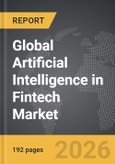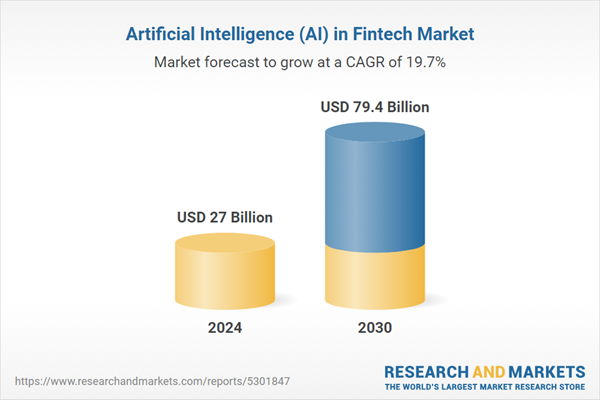Global Artificial Intelligence (AI) in Fintech Market - Key Trends and Drivers Summarized
How Is AI Reshaping Financial Operations and Risk Management?
Artificial Intelligence (AI) is revolutionizing the financial services industry, transforming the ways institutions handle core operations, mitigate risks, and ensure regulatory compliance. Traditionally, financial operations have relied on manual processes and periodic reviews to assess risks, leaving room for inefficiencies and human error. Now, AI-powered algorithms process large datasets in real time, identifying patterns that reveal hidden risks and flagging unusual transactions that may indicate fraud. Machine learning models are particularly useful in credit scoring, where they analyze a borrower’s financial behavior to determine creditworthiness more accurately than traditional methods. For instance, companies like Zest AI and Upstart employ machine learning to assess credit risk based on alternative data points, making lending more inclusive while reducing default rates. AI’s predictive analytics also support banks in stress testing and regulatory reporting, enhancing their ability to meet complex regulatory standards with precision and timeliness. By streamlining operations and enabling more accurate risk management, AI is not only enhancing financial stability but also reshaping core functions within the financial sector.Can AI Personalize and Improve Customer Experiences in Fintech?
AI-driven solutions are significantly enhancing customer experience within the fintech space, providing personalized services and a more seamless banking experience. Chatbots and virtual assistants powered by natural language processing (NLP) interact with customers around the clock, answering queries, guiding them through processes, and even providing financial advice tailored to their spending habits. For instance, Bank of America’s Erica and Capital One’s Eno are AI-powered assistants that help customers manage transactions, monitor account activity, and achieve their savings goals, creating a highly personalized banking experience. Additionally, AI recommendation engines analyze users’ financial behaviors and transaction histories to offer insights and product suggestions that align closely with their financial needs. Robo-advisors, like those offered by companies such as Wealthfront and Betterment, deliver personalized investment advice and portfolio management based on individual financial goals and risk tolerance, democratizing wealth management for a broader audience. Through these technologies, AI is reshaping customer engagement in fintech, providing personalized, accessible, and responsive services that foster loyalty and trust.How is AI Revolutionizing Fraud Detection and Cybersecurity in Financial Services?
In the digital era, cybersecurity and fraud detection are paramount for financial institutions, and AI plays a central role in addressing these critical areas. As cyber threats grow increasingly sophisticated, AI-powered systems equipped with machine learning and deep learning algorithms are essential in detecting anomalies that may signify fraudulent activity or cyber attacks. Traditional rule-based systems often struggle to keep up with evolving threats, but AI continuously learns and adapts, identifying patterns and potential vulnerabilities in real time. Companies like Darktrace and Palantir employ AI-driven cybersecurity systems that identify, respond to, and contain threats before they cause significant damage, helping institutions protect sensitive customer data and ensure regulatory compliance. AI-driven fraud detection solutions analyze massive volumes of transactional data to flag unusual behavior, stopping fraudulent transactions before they occur. By leveraging AI in these ways, financial institutions not only safeguard assets but also maintain consumer trust, which is essential in an increasingly digital financial landscape.What’s Driving the Growth of AI in the Fintech Market?
The growth in the AI in fintech market is driven by several factors, spurred by technological advancements, evolving consumer expectations, and the demand for greater security and regulatory compliance. A surge in digital banking and online financial services has necessitated AI-powered tools that can manage, analyze, and secure large volumes of financial data efficiently. Consumers’ growing demand for personalized, convenient financial services has led fintech companies to adopt AI-driven recommendation engines, virtual assistants, and robo-advisors that provide tailored financial solutions. Advances in machine learning and natural language processing are further enabling real-time insights and customer interactions, which are crucial for improving engagement and satisfaction in a competitive market. Additionally, the rise in cyber threats has increased the need for robust AI-driven cybersecurity solutions, which offer proactive threat detection and fraud prevention capabilities that traditional methods cannot match. Regulatory pressure is another growth driver, as AI’s capacity to enhance accuracy in reporting and compliance processes helps financial institutions meet stringent standards and avoid hefty fines. With strategic partnerships between fintech firms and tech giants accelerating innovation, AI is becoming essential to the fintech ecosystem, addressing demands for efficiency, security, and personalized service delivery.SCOPE OF STUDY:
The report analyzes the Artificial Intelligence (AI) in Fintech market in terms of units by the following Segments, and Geographic Regions/Countries:- Segments: Component (Solutions, Services); Deployment (Cloud, On-Premise); Application (Business Analytics & Reporting, Customer Behavioral Analytics, Virtual Assistant, Other Applications)
- Geographic Regions/Countries: World; United States; Canada; Japan; China; Europe (France; Germany; Italy; United Kingdom; and Rest of Europe); Asia-Pacific; Rest of World.
Key Insights:
- Market Growth: Understand the significant growth trajectory of the Solutions segment, which is expected to reach US$42.9 Billion by 2030 with a CAGR of a 18.6%. The Services segment is also set to grow at 21.1% CAGR over the analysis period.
- Regional Analysis: Gain insights into the U.S. market, valued at $7.8 Billion in 2024, and China, forecasted to grow at an impressive 19.4% CAGR to reach $12.5 Billion by 2030. Discover growth trends in other key regions, including Japan, Canada, Germany, and the Asia-Pacific.
Why You Should Buy This Report:
- Detailed Market Analysis: Access a thorough analysis of the Global Artificial Intelligence (AI) in Fintech Market, covering all major geographic regions and market segments.
- Competitive Insights: Get an overview of the competitive landscape, including the market presence of major players across different geographies.
- Future Trends and Drivers: Understand the key trends and drivers shaping the future of the Global Artificial Intelligence (AI) in Fintech Market.
- Actionable Insights: Benefit from actionable insights that can help you identify new revenue opportunities and make strategic business decisions.
Key Questions Answered:
- How is the Global Artificial Intelligence (AI) in Fintech Market expected to evolve by 2030?
- What are the main drivers and restraints affecting the market?
- Which market segments will grow the most over the forecast period?
- How will market shares for different regions and segments change by 2030?
- Who are the leading players in the market, and what are their prospects?
Report Features:
- Comprehensive Market Data: Independent analysis of annual sales and market forecasts in US$ Million from 2024 to 2030.
- In-Depth Regional Analysis: Detailed insights into key markets, including the U.S., China, Japan, Canada, Europe, Asia-Pacific, Latin America, Middle East, and Africa.
- Company Profiles: Coverage of players such as Amazon Web Services, Complyadvantage.Com, Google, IBM, Inbenta Technologies and more.
- Complimentary Updates: Receive free report updates for one year to keep you informed of the latest market developments.
Some of the 239 companies featured in this Artificial Intelligence (AI) in Fintech market report include:
- Amazon Web Services
- Complyadvantage.Com
- IBM
- Inbenta Technologies
- Intel
- Ipsoft
- Microsoft
- Next It Corp.
- Nuance Communications
- Narrative Science
- Salesforce.Com
- Samsung
This edition integrates the latest global trade and economic shifts as of June 2025 into comprehensive market analysis. Key updates include:
- Tariff and Trade Impact: Insights into global tariff negotiations across 180+ countries, with analysis of supply chain turbulence, sourcing disruptions, and geographic realignment. Special focus on 2025 as a pivotal year for trade tensions, including updated perspectives on the Trump-era tariffs.
- Adjusted Forecasts and Analytics: Revised global and regional market forecasts through 2030, incorporating tariff effects, economic uncertainty, and structural changes in globalization. Includes segmentation by product, technology, type, material, distribution channel, application, and end-use, with historical analysis since 2015.
- Strategic Market Dynamics: Evaluation of revised market prospects, regional outlooks, and key economic indicators such as population and urbanization trends.
- Innovation & Technology Trends: Latest developments in product and process innovation, emerging technologies, and key industry drivers shaping the competitive landscape.
- Competitive Intelligence: Updated global market share estimates for 2025, competitive positioning of major players (Strong/Active/Niche/Trivial), and refined focus on leading global brands and core players.
- Expert Insight & Commentary: Strategic analysis from economists, trade experts, and domain specialists to contextualize market shifts and identify emerging opportunities.
- Complimentary Update: Buyers receive a free July 2025 update with finalized tariff impacts, new trade agreement effects, revised projections, and expanded country-level coverage.
Table of Contents
Companies Mentioned (Partial List)
A selection of companies mentioned in this report includes, but is not limited to:
- Amazon Web Services
- Complyadvantage.Com
- IBM
- Inbenta Technologies
- Intel
- Ipsoft
- Microsoft
- Next It Corp.
- Nuance Communications
- Narrative Science
- Salesforce.Com
- Samsung
Table Information
| Report Attribute | Details |
|---|---|
| No. of Pages | 192 |
| Published | January 2026 |
| Forecast Period | 2024 - 2030 |
| Estimated Market Value ( USD | $ 27 Billion |
| Forecasted Market Value ( USD | $ 79.4 Billion |
| Compound Annual Growth Rate | 19.7% |
| Regions Covered | Global |









